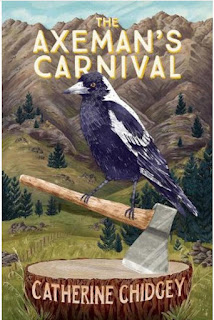Less
is Lost, by Andrew Sean Greer.
It is an infinite pleasure to welcome back Arthur Less,
hapless hero of ‘Less’, Andrew Sean Greer’s 2018 Pulitzer Prize-winning
novel. He hasn’t changed much; he’s still a minor American novelist; he’s still shy and blushes easily, confidence
a fleeting visitor in his life and work, but!
He is still with his great love, Freddie Palu, living in the tiny house
of his famous poet ex-lover (recently deceased) in San Francisco – but.
For a number of obscure reasons, Arthur is unsure of
Freddie’s devotion, especially as Freddie, a high school teacher, has removed
himself to Maine on a three-month sabbatical, taking a university course in
narrative form. Arthur plans to join
Freddie as soon as possible, and make a start on his next novel. It’s no fun living alone in their hilly
little eyrie, and having to attend the ex’s last rites with the ex’s widow
Marian who, after years of hating him for stealing her husband, now relies on
him to be her emotional and physical support at the great man’s funeral. Life is full of ironies, big and small. And bombshells delivered by Marian, in the
shape of monies owed by Less for the aforesaid Eyrie – for which he has paid no
rent of any kind for at least ten years – and a time limit of one month in
which he has to find the money ‘so that the will can be probated, then the
Eyrie will be his’. When the news is
relayed to Freddie, he is aghast: how can
someone never think to question
whether he owes rent? ‘The subject never
came up,’ says Arthur uncomfortably.
Even he sees that this is taking trust too far.
Strong
action must be taken: no trip to Maine
to see outraged Freddie – he must go on the Southern speaking tour and the
PrizeGiving Committee that his agent has commanded he attend, and oversee in
Savannah the turning into a musical (!) of one of his short stories about his
boyhood: if he slogs his way through
this Southern Odyssey, he will have earned enough to clear the debt.
And
here Mr Greer has a wonderful time – and so do we! - with Arthur’s adventures in his borrowed van
which, the farther South he travels, seem to call for ever more U.S. flags and
bumper stickers (he even wears a cap and grows – not very well – a beard), but
never seems able to disguise his gayness, for he is always asked ‘are you Dutch?’ But faint heart never won Fair Freddie, and
Less, fired by love, has the stoutest heart of all. His quest is laugh-out-loud funny, and
Greer’s wonderful facility with language is a perpetual pleasure, for Less will
always be more than the sum of his parts.
FIVE STARS.



